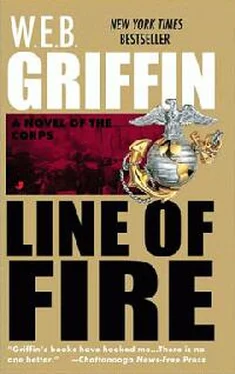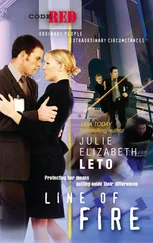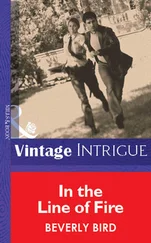W.E.B. Griffin - The Corps V - Line of Fire
Здесь есть возможность читать онлайн «W.E.B. Griffin - The Corps V - Line of Fire» весь текст электронной книги совершенно бесплатно (целиком полную версию без сокращений). В некоторых случаях можно слушать аудио, скачать через торрент в формате fb2 и присутствует краткое содержание. Жанр: prose_military, на английском языке. Описание произведения, (предисловие) а так же отзывы посетителей доступны на портале библиотеки ЛибКат.
- Название:The Corps V - Line of Fire
- Автор:
- Жанр:
- Год:неизвестен
- ISBN:нет данных
- Рейтинг книги:4 / 5. Голосов: 1
-
Избранное:Добавить в избранное
- Отзывы:
-
Ваша оценка:
- 80
- 1
- 2
- 3
- 4
- 5
The Corps V - Line of Fire: краткое содержание, описание и аннотация
Предлагаем к чтению аннотацию, описание, краткое содержание или предисловие (зависит от того, что написал сам автор книги «The Corps V - Line of Fire»). Если вы не нашли необходимую информацию о книге — напишите в комментариях, мы постараемся отыскать её.
The Corps V - Line of Fire — читать онлайн бесплатно полную книгу (весь текст) целиком
Ниже представлен текст книги, разбитый по страницам. Система сохранения места последней прочитанной страницы, позволяет с удобством читать онлайн бесплатно книгу «The Corps V - Line of Fire», без необходимости каждый раз заново искать на чём Вы остановились. Поставьте закладку, и сможете в любой момент перейти на страницу, на которой закончили чтение.
Интервал:
Закладка:
"Anything unusual I should know?" Dawkins shook his head.
"Same drill. We generally get thirty minutes' notice from the Coastwatcher people, via either Pearl Harbor or Townsville.
That gives us enough time to get off the ground and to altitude.
By then the radar can usually give us a vector. We shoot them down or they shoot us down. That will go on until one side or the other runs out of airplanes. Right now, unless we get some help from the Navy, that looks like us."
"There was a bunch of F4F pilots on Espiritu. Right out of Pensacola." "That's academic. We don't have airplanes for them to fly." Their eyes met for a moment, and then Galloway said, "I suppose I better go see Dunn and let him know I'm back." As the next senior officer present for duty, First Lieutenant William Charles Dunn, USMCR, assumed command of VMF229 after Galloway was shot down and presumed dead. Bill Dunn was twenty-one years old; he stood five feet six, weighed no more than 135 pounds, and looked to Dawkins like a college cheerleader. He became an ace the day he took over VMF-229.
Dawkins nodded, and then stood up and offered his hand.
"I'm glad you came through, Charley. God knows how, but I'll deal with the people you've pissed off."
"Thank you, Sir." Galloway had gone no farther than two hundred yards from Dawkins' tent when a siren began to wail. He looked at the control tower. A black flag-signifying air base under attack was being hoisted on the flagpole.
He started to trot toward the area where the aircraft of VMF-229 were parked in sandbagged revetments. Then, realizing that he really had no reason to rush to his airplane, he slowed to a walk: The F4F with CAPT C. GALLOWAY USMCR painted below the canopy track was now at the bottom of the sea.
Soon he heard the peculiar sound of Wildcat engines starting, and then the different sound of R4D engines being run up to takeoff power. He looked down the runway in time to see the R4D he'd flown in to Guadalcanal begin its takeoff roll. A moment later it flashed over his head.
No more than sixty seconds later, the first F4F with MARINES painted on its fuselage bounced down the runway and staggered into the air, followed almost immediately by half a dozen others.
From his position, he could not see into their cockpits and identify their pilots.
He kept walking toward the squadron area.
The next time the Japanese come, I will bump one of my eager young lieutenants out of his seat. Will I be doing that because I really think that a squadron commander's place is in the air with his men? Or was that doctor on Espiritu right, that anyone who does such things when he hasn't been ordered to is by definitional out of his mind?
Chapter Two
[One]
U.S. MARINE CORPS RECRUIT DEPOT
PARRIS ISLAND, SOUTH CAROLINA
31 AUGUST 1942
Prior to his enlistment in The Marine Corps, George F. Hart, USMCR, was employed by the Saint Louis, Missouri, Police Department. Specifically, the twenty-four-year-old fifth son and eighth child of Captain (of the Saint Louis police) and Mrs. Karl J. Hart was the youngest (ever) detective on that organization I s Vice Squad. Law enforcement was something of a family tradition.
After immigrating to the United States from Silesia, George's paternal grandfather, Anton Hartzberger, joined the force a month after he became an American citizen. He retired as a sergeant.
Two of Anton's sons, George's father and his Uncle Fred (legally Friedrich), went on the cops, as did two of George's brothers and a pair of cousins. Uncle Fred was a harness bull sergeant and happy to be where he was... though he thought it would be nice if he made lieutenant later, because of the pension. George's father, Karl, was promoted to Captain shortly after he was placed in charge of the Homicide Bureau; and he had ambitions for higher rank. But he believed his ambitions were damaged all along by the perception that he was one more stupid Kraut-of which, it must be admitted, the Saint Louis police had a more than adequate supply.
When Georg Friedrich Hartzberger was in the eighth grade, Sergeant Karl Hartzberger took his wife and his children to a judge's chambers. They emerged the Hart family, with all their given names Anglicized.
After he graduated from high school, George found employment as a truck driver's helper for a well-known Saint Louis brewery-despite misgivings that he wasn't big or strong enough to handle it.
Legally, he should have been over twenty-one before taking employment in the alcohol industry. But that provision of law was enforced by the police department, none of whose members saw reason to inquire just how old Captain Hart's kid was.
And so for close to three years, he manhandled beer kegs and cases of bottled beer from loading dock to truck, and from truck to saloon or store basements, or to wherever those in the business of slaking the thirst of their fellow citizens chose to keep their supplies of brew.
George Hart was sworn in as a police officer when he was twenty-one. By then the regimen of beer-keg tossing had given him a remarkable musculature. While he wasn't built like et circus strongman-as many of his coworkers were-he was extraordinarily strong. For example, he could (and often did, when sampling his employer's wares) cause an unopened beer can to explode by crushing it in his hand.
He had also been inside just about every hotel, motel, restaurant, tavern, bar and grill, saloon, and whorehouse in both Saint Louis and East Saint Louis, its neighbor across the river in Illinois.
The usual period of rookie training-riding around with an experienced officer so as to become familiar with the city and with police procedures-was very short for Officer Hart. He already knew the city, and there wasn't much about the police department that he hadn't already learned before he joined the cops.
Afterward, he was assigned as a plain-clothes officer to the Vice Squad. The mission of the Vice Squad was the suppression of gambling, prostitution, narcotics, and crimes against nature.
As a practical matter, as long as the girls in the houses behaved themselves (which meant they didn't roll their clientele or sell them narcotics), the whorehouses were left pretty much alone.
Nor did the police get very excited about a bunch of guys sitting around playing poker or shooting crap.
For the most part that left the drug dealers, the fairies, and the pimps especially black pimps who preyed on young women, especially really young, fourteen-, fifteen-year-old white country girls who came to Saint Louis seeking fame and fortune. And also, for obvious reasons, the Squad came down hard on badger operations: A guy takes a girl to a hotel room expecting to get a five-dollar piece of ass; instead he finds some guy waving a badge at him, saying he's a cop, and wanting twenty bucks not to run him in and cause him severe public humiliation. And then there were the fucking unwashed hillbillies who came to Saint Louis to find a job, found that a job meant work, and decided it was easier to rent out their fourteen-year-old daughters to make their moonshine money.
These guys really offended Officer George Hart's sense of decency.
Hart had been working plain-clothes Vice about six months when he was awarded his first citation. He was in a bar down by the river, just nosing around, when two guys stuck it up.
One of them had a.38 Smith and Wesson Military and Police, the other one had a.22 Colt Woodsman. Hart wasn't going to do anything about it except remember what they looked like, but a uniform walked in off the street and tried to be a hero. When the robbers shot him, there was nothing Hart could do but shoot the robbers. He killed one; the other would be paralyzed for the rest of his life.
Four months after that, he was in another bar, just nosing around, when a guy came looking for his wife. He found her where he thought she would be, with some other guy, and shot her. He then saw Hart taking out his pistol and was making up his mind whether to shoot the boyfriend or Hart, when Hart shot him.
Читать дальшеИнтервал:
Закладка:
Похожие книги на «The Corps V - Line of Fire»
Представляем Вашему вниманию похожие книги на «The Corps V - Line of Fire» списком для выбора. Мы отобрали схожую по названию и смыслу литературу в надежде предоставить читателям больше вариантов отыскать новые, интересные, ещё непрочитанные произведения.
Обсуждение, отзывы о книге «The Corps V - Line of Fire» и просто собственные мнения читателей. Оставьте ваши комментарии, напишите, что Вы думаете о произведении, его смысле или главных героях. Укажите что конкретно понравилось, а что нет, и почему Вы так считаете.









